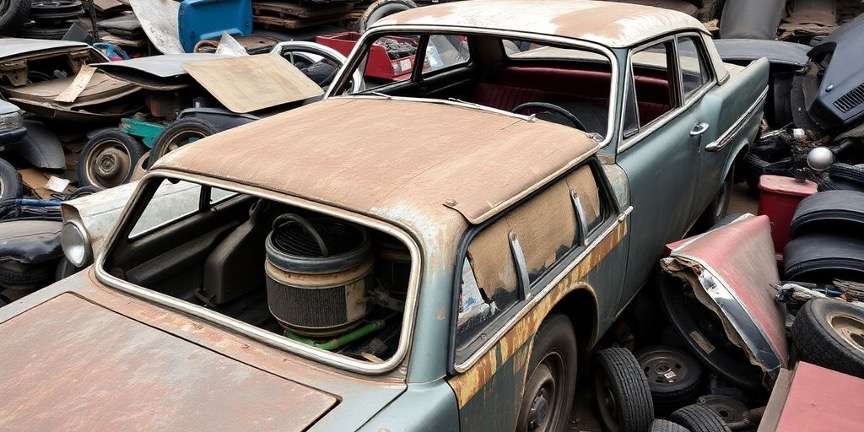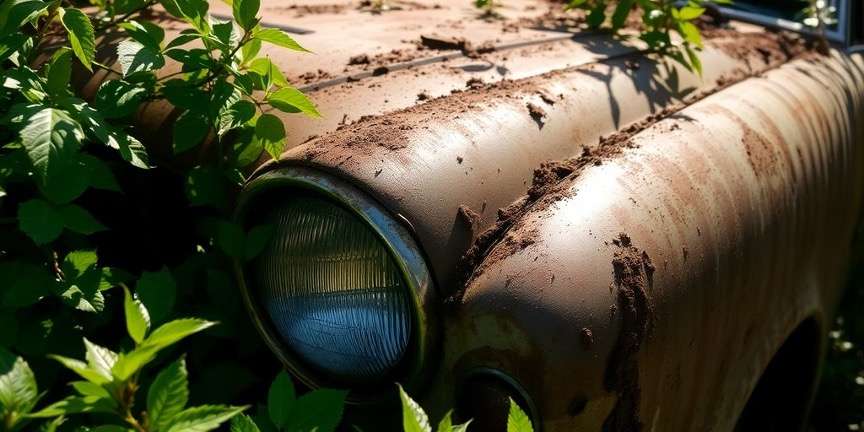Key Takeaways
- Check your state’s DMV requirements before selling a junk car.
- Make sure you have all the necessary documents like the title and bill of sale.
- Understand the process for transferring the car's title to the new owner.
- Find a reputable junk car buyer to avoid scams.
- Consider eco-friendly disposal options for your junk car.
Understanding State-Specific Legal Requirements

Researching Your State's DMV Guidelines
Selling a junk car isn't as simple as just handing over the keys. Each state has its own set of rules and guidelines you must follow. Checking with your state's Department of Motor Vehicles (DMV) is crucial. They provide the most accurate info on what you need to do. Some states might have specific forms you need to fill out, while others could require certain fees. It's all about making sure you're doing it by the book.
Identifying Required Documentation
When it comes to selling a junk car, having the right paperwork is key. You'll need to gather documents like the vehicle's title, a bill of sale, and possibly proof of insurance. Some states might ask for additional paperwork, like a smog certificate or a release of liability. Make sure to check exactly what's needed in your state, so you don't hit any snags during the sale.
Complying with Local Environmental Regulations
It's not just about the paperwork. Many states have environmental regulations you need to follow when selling a junk car. This could involve ensuring the car is free from hazardous materials or that it's disposed of in an eco-friendly manner. Ignoring these regulations can lead to fines or other penalties, so it's best to know what's expected from you ahead of time.
Gathering Essential Documents for the Sale
When selling a junk car, gathering the right documents is like packing for a trip; you don't want to forget the essentials.
Obtaining a Duplicate Title if Necessary
First off, check if you've got the car title. It's the golden ticket that proves you own the vehicle. If it's missing, you'll need to get a duplicate from your state's DMV. The process usually involves filling out a form and paying a small fee. Without the title, the sale can hit a dead end.
Preparing a Comprehensive Bill of Sale
Next, draft a bill of sale. This document is your receipt for the transaction. It should include details like the sale price, the car's condition, and the buyer and seller's information. Some states might even require it to be notarized.
Ensuring Proper Vehicle Registration
Lastly, make sure your registration is up to date. This is the official record that links you to the car. If it's expired, you might need to renew it before the sale.
Getting all your paperwork in order might seem like a hassle, but it makes the selling process smooth and stress-free. Plus, it protects you from any future headaches if the car ends up in a scrap yard or back on the road.
Navigating the Title Transfer Process

Steps for Transferring Ownership
Transferring ownership of a junk car isn't as daunting as it might seem. First off, you need to have the car title in your name. Without this, you can't legally sell the vehicle. Here's a simple step-by-step guide to help you out:
- Verify Ownership: Ensure the title lists you as the owner. This is crucial to avoid any hiccups.
- Fill Out the Title: Complete the seller's section with details like the odometer reading and the sale price.
- Sign the Title: Both you and the buyer need to sign the title to make the transfer official.
- Submit the Title Transfer Form: Once everything is signed, submit the form to your state's DMV or equivalent agency.
Handling Salvage and Rebuilt Titles
If your car has a salvage or rebuilt title, selling it might require a few extra steps. A salvage title means the car was deemed a total loss at some point, while a rebuilt title indicates it was repaired and passed inspection. Here's what you need to do:
- Disclose the Status: Always let potential buyers know about the salvage or rebuilt status upfront.
- Provide Proof of Repairs: If it's a rebuilt title, be ready to show proof of repairs and any inspection reports.
- Complete the Right Forms: Different forms might be needed for these titles, so check with your local DMV.
Dealing with Missing Titles
Lost your car title? Don't worry, you're not alone. Many people misplace their titles, but you can still sell your car. Here's how:
- Apply for a Duplicate Title: Head to your local DMV and apply for a duplicate. You'll likely need to provide proof of identity and ownership.
- Pay the Fee: There might be a small fee for the duplicate title, so be prepared for that.
- Wait for Processing: It can take a few weeks for the duplicate title to arrive, so factor this into your timing.
Selling a junk car without the right paperwork can lead to delays or even legal troubles. Make sure you've got everything sorted before finalizing the sale.
Working with Junkyards and Buyers
Finding Reputable Junk Car Buyers
When you're ready to part ways with your old car, finding a trustworthy buyer is key. Start by doing some homework online. Check out reviews and ratings on platforms like the Better Business Bureau to get a sense of a buyer's reputation. Word of mouth can also be super helpful, so ask around—friends or family might have some solid recommendations.
Here's a quick checklist to guide your search:
- Research online reviews: Look for feedback from other sellers to understand their experiences.
- Verify credentials: Ensure the buyer is licensed and follows local regulations.
- Watch for red flags: If an offer seems too good to be true, it probably is.
Negotiating Fair Prices
Once you've found some potential buyers, it's time to talk numbers. The price you get will depend on several things, like the make, model, age, and condition of your car. Be upfront about any issues your car has—honesty can go a long way in these deals.
Here are some tips for negotiating:
- Know your car's market value. Use tools like Kelley Blue Book to get an idea of what your car is worth.
- Be ready to haggle. Have a minimum price in mind and be open to negotiations.
- Understand the offer. Make sure all terms, including pickup arrangements and payment methods, are clear.
Understanding Buyer Requirements
Different buyers might have different needs, so it's important to know what they expect from you. Some might offer free towing services, which is a nice perk if your car can't be driven. Others might require specific paperwork or conditions.
Here's what to keep in mind:
- Towing services: Check if the buyer offers free towing, which can save you money.
- Documentation: Have all necessary paperwork ready, like the car's title and registration.
- Payment methods: Confirm how you'll get paid—cash, check, or another method.
Selling a junk car can seem daunting, but with the right approach, it can be a smooth and straightforward process. Remember, the key is to find a buyer you trust and to be clear about your car's condition and your expectations.
Finalizing the Sale Legally and Safely
Selling your junk car involves more than just shaking hands and handing over the keys. To ensure a smooth and legal transaction, you need to follow a few important steps.
Completing the Bill of Sale
The bill of sale is your legal proof that the car has changed hands. It should include details like the buyer's and seller's names, the vehicle's identification number, and the agreed sale price. Both parties need to sign this document to make it official. In some states, you might need to get it notarized, so it's a good idea to check with your local DMV.
Notifying the DMV of the Sale
Once the sale is complete, it's crucial to notify the DMV. This step is important because it removes your name from the car's registration, freeing you from any future liabilities. Make sure to fill out any required forms and submit them to the DMV promptly. This might involve completing a form to notify the DMV, which can vary depending on your location.
Removing License Plates and Cancelling Insurance
After selling your car, don't forget to remove the license plates. You'll want to keep them in a safe place until you can return them to your local DMV. Also, contact your insurance company to cancel your policy for the vehicle. This ensures you're not paying for coverage you no longer need and helps you avoid any potential issues down the road.
Taking these steps not only protects you legally but also provides peace of mind knowing that everything is handled properly. It's always better to be safe than sorry when it comes to selling a vehicle, even if it's just a junk car.
Exploring Eco-Friendly Disposal Options
Recycling Your Junk Car Responsibly
Getting rid of a junk car doesn't have to mean sending it straight to the landfill. Recycling is a fantastic way to give your old car a new life. Most of the materials in a vehicle, like steel, aluminum, and rubber, can be recycled and reused. This not only helps reduce waste but also conserves natural resources. To start, contact local recycling centers or junkyards that specialize in vehicle recycling. They often offer pick-up services, making the process hassle-free.
Donating to Charitable Organizations
If your junk car still has some life left in it, consider donating it to a charitable organization. Many charities accept vehicle donations, which they either use for their operations or sell to raise funds. This option not only supports a good cause but might also offer you a tax deduction. Make sure to get a receipt and check the charity's credentials to ensure your donation is going to a legitimate organization.
Understanding the Environmental Impact
The environmental impact of disposing of a junk car improperly can be significant. Cars contain hazardous materials such as oil, battery acid, and other fluids that can harm the environment if not handled correctly. By choosing eco-friendly disposal methods, you help prevent soil and water contamination and reduce the carbon footprint associated with manufacturing new materials.
By recycling or donating your junk car, you're not just cleaning up your driveway—you're contributing to a cleaner planet. Every small action counts toward a more sustainable future.
Avoiding Common Pitfalls in Junk Car Sales
Recognizing Scams and Fraudulent Buyers
Selling a junk car might seem like a simple task, but it's easy to fall into traps set by scammers. Always research potential buyers thoroughly before making any deals. Check reviews or ratings and look for any red flags, like prices that seem too good to be true. If a buyer hesitates to provide clear contact information or insists on unusual payment methods, consider these as warning signs.
Ensuring All Paperwork is Complete
Paperwork is a big deal in any vehicle sale, especially with junk cars. You need to make sure all the documents, like the title and bill of sale, are in order. Missing or incomplete paperwork can cause headaches down the line, possibly leaving you responsible for the car even after you've sold it. For instance, notifying the DMV about the sale is crucial to avoid future liabilities.
Protecting Personal Information
When you're selling a car, especially an old one, it’s important to protect your personal data. Remove any documents or items with personal info from the vehicle. Make sure not to overshare details with buyers, especially online. A little caution goes a long way in keeping your identity safe.
Selling your junk car can be straightforward if you avoid common mistakes. Don’t rush into the first offer you get. Take your time to ensure everything is legitimate and properly documented.
Conclusion
Selling a junk car might seem like a hassle, but with the right info, it can be pretty straightforward. Remember to gather all the necessary documents like the title and bill of sale, and make sure you understand your state's specific requirements. This way, you protect yourself legally and ensure a smooth transaction. Also, don't forget to remove your personal items from the car before handing it over. Whether you're selling for cash or donating to a good cause, taking these steps will help you get the most out of your old vehicle. So, take a deep breath, follow the steps, and you'll be on your way to clearing out that old clunker in no time.
Frequently Asked Questions
What papers do I need to sell my junk car?
To sell your junk car, you usually need a driver's license and the car's title. Some buyers might also ask for the car's registration and other documents.
What kinds of vehicles do junk car buyers purchase?
Junk car buyers usually take all sorts of vehicles, like cars, trucks, SUVs, vans, and even motorcycles. They often accept vehicles that don't run or are damaged.
How much money can I get for my junk car?
The money you get for your junk car depends on things like its make, model, condition, and market demand. Most buyers offer prices based on the car's weight and scrap metal value.
Is it worth selling a junk car that needs a lot of repairs?
If fixing your car costs more than it's worth or if it's not safe to drive, selling it to a junk car buyer is a good idea. They will still pay you a fair price.
What happens to my junk car after I sell it?
After you sell your junk car, salvage yards usually take it apart and recycle or reuse its parts. Some parts might be sold or the car might be fixed up for resale.
Do I need to tell the DMV after selling my junk car?
Yes, you should tell the DMV after you sell your junk car to avoid any future problems and to make sure the car isn't still in your name.



